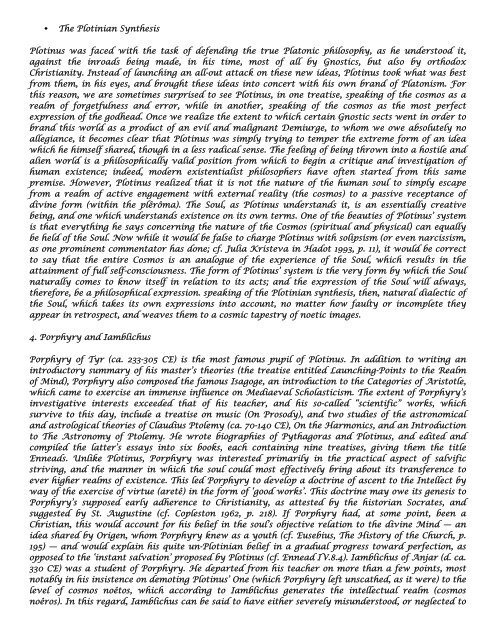Neo-Platonism - Grand Lodge Bet-El
Neo-Platonism - Grand Lodge Bet-El
Neo-Platonism - Grand Lodge Bet-El
You also want an ePaper? Increase the reach of your titles
YUMPU automatically turns print PDFs into web optimized ePapers that Google loves.
• The Plotinian Synthesis<br />
Plotinus was faced with the task of defending the true Platonic philosophy, as he understood it,<br />
against the inroads being made, in his time, most of all by Gnostics, but also by orthodox<br />
Christianity. Instead of launching an all-out attack on these new ideas, Plotinus took what was best<br />
from them, in his eyes, and brought these ideas into concert with his own brand of <strong>Platonism</strong>. For<br />
this reason, we are sometimes surprised to see Plotinus, in one treatise, speaking of the cosmos as a<br />
realm of forgetfulness and error, while in another, speaking of the cosmos as the most perfect<br />
expression of the godhead. Once we realize the extent to which certain Gnostic sects went in order to<br />
brand this world as a product of an evil and malignant Demiurge, to whom we owe absolutely no<br />
allegiance, it becomes clear that Plotinus was simply trying to temper the extreme form of an idea<br />
which he himself shared, though in a less radical sense. The feeling of being thrown into a hostile and<br />
alien world is a philosophically valid position from which to begin a critique and investigation of<br />
human existence; indeed, modern existentialist philosophers have often started from this same<br />
premise. However, Plotinus realized that it is not the nature of the human soul to simply escape<br />
from a realm of active engagement with external reality (the cosmos) to a passive receptance of<br />
divine form (within the plêrôma). The Soul, as Plotinus understands it, is an essentially creative<br />
being, and one which understands existence on its own terms. One of the beauties of Plotinus’ system<br />
is that everything he says concerning the nature of the Cosmos (spiritual and physical) can equally<br />
be held of the Soul. Now while it would be false to charge Plotinus with solipsism (or even narcissism,<br />
as one prominent commentator has done; cf. Julia Kristeva in Hadot 1993, p. 11), it would be correct<br />
to say that the entire Cosmos is an analogue of the experience of the Soul, which results in the<br />
attainment of full self-consciousness. The form of Plotinus’ system is the very form by which the Soul<br />
naturally comes to know itself in relation to its acts; and the expression of the Soul will always,<br />
therefore, be a philosophical expression. speaking of the Plotinian synthesis, then, natural dialectic of<br />
the Soul, which takes its own expressions into account, no matter how faulty or incomplete they<br />
appear in retrospect, and weaves them to a cosmic tapestry of noetic images.<br />
4. Porphyry and Iamblichus<br />
Porphyry of Tyr (ca. 233-305 CE) is the most famous pupil of Plotinus. In addition to writing an<br />
introductory summary of his master’s theories (the treatise entitled Launching-Points to the Realm<br />
of Mind), Porphyry also composed the famous Isagoge, an introduction to the Categories of Aristotle,<br />
which came to exercise an immense influence on Mediaeval Scholasticism. The extent of Porphyry’s<br />
investigative interests exceeded that of his teacher, and his so-called “scientific” works, which<br />
survive to this day, include a treatise on music (On Prosody), and two studies of the astronomical<br />
and astrological theories of Claudius Ptolemy (ca. 70-140 CE), On the Harmonics, and an Introduction<br />
to The Astronomy of Ptolemy. He wrote biographies of Pythagoras and Plotinus, and edited and<br />
compiled the latter’s essays into six books, each containing nine treatises, giving them the title<br />
Enneads. Unlike Plotinus, Porphyry was interested primarily in the practical aspect of salvific<br />
striving, and the manner in which the soul could most effectively bring about its transference to<br />
ever higher realms of existence. This led Porphyry to develop a doctrine of ascent to the Intellect by<br />
way of the exercise of virtue (aretê) in the form of ‘good works’. This doctrine may owe its genesis to<br />
Porphyry’s supposed early adherence to Christianity, as attested by the historian Socrates, and<br />
suggested by St. Augustine (cf. Copleston 1962, p. 218). If Porphyry had, at some point, been a<br />
Christian, this would account for his belief in the soul’s objective relation to the divine Mind — an<br />
idea shared by Origen, whom Porphyry knew as a youth (cf. Eusebius, The History of the Church, p.<br />
195) — and would explain his quite un-Plotinian belief in a gradual progress toward perfection, as<br />
opposed to the ‘instant salvation’ proposed by Plotinus (cf. Ennead IV.8.4). Iamblichus of Anjar (d. ca.<br />
330 CE) was a student of Porphyry. He departed from his teacher on more than a few points, most<br />
notably in his insistence on demoting Plotinus’ One (which Porphyry left unscathed, as it were) to the<br />
level of cosmos noêtos, which according to Iamblichus generates the intellectual realm (cosmos<br />
noêros). In this regard, Iamblichus can be said to have either severely misunderstood, or neglected to
















